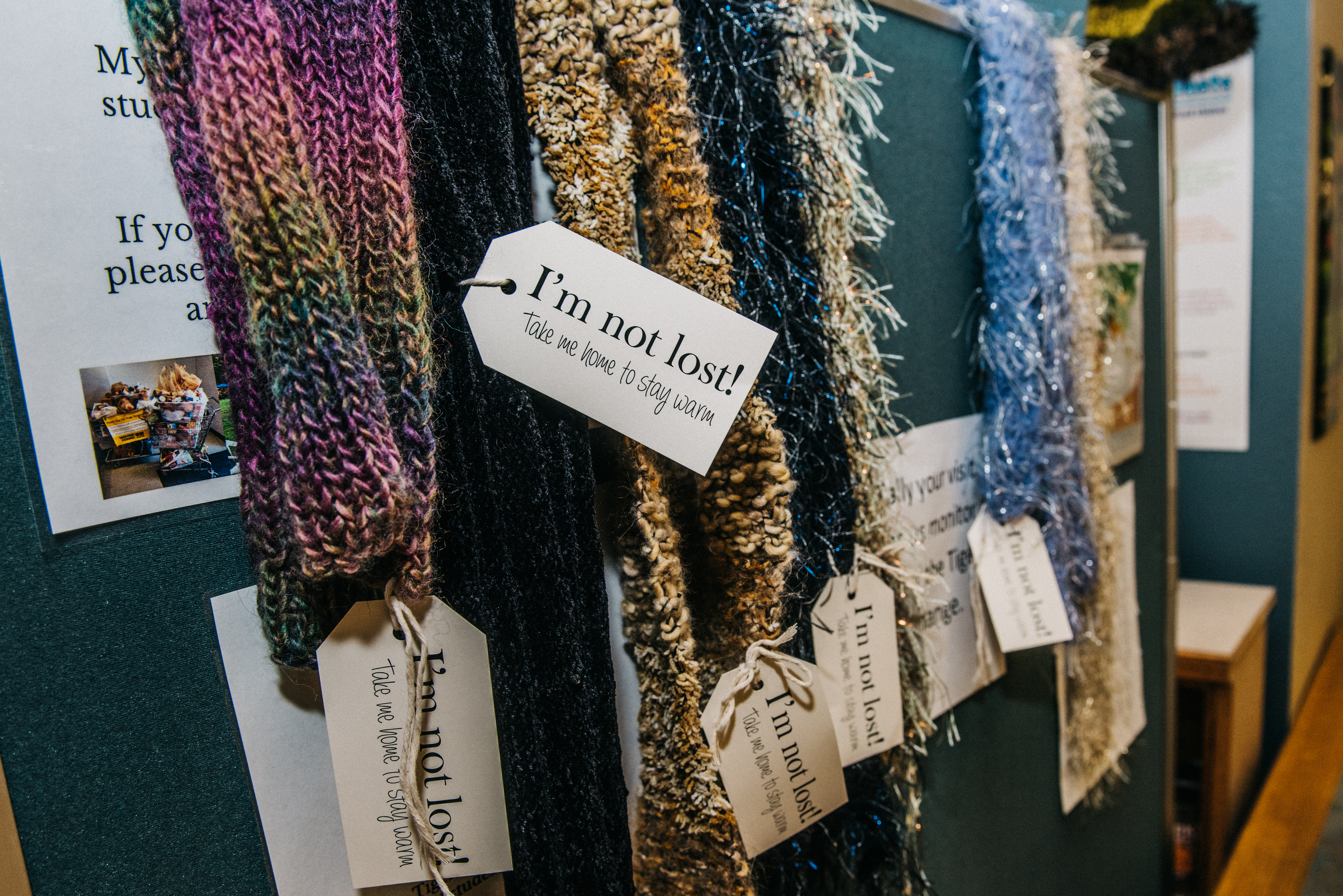Local knitting circle gives Fort Hays State a warm gesture of goodwill

02/06/18
By Diane Gasper-O’Brien
University Relations and Marketing
HAYS, Kan. – Shane Keller grew up in the south central Kansas town of St. John and was well aware of how unpredictable Kansas weather is.
Nonetheless, Keller – now a senior at Fort Hays State University – admits that he doesn’t always know when to carry a stocking cap, what with Hays temperatures varying from 50 degrees early in the week to single digits just a few days later.
So he knows there are students from other parts of the United States such as California or Arizona, and other countries as well, who can get caught without proper headgear while walking to class on any given day.
That’s why Keller – a student employee at the Tiger Food Exchange at FHSU – was excited when he learned a local knitting circle wanted to donate hats and scarves to the Fort Hays State campus.
An avid knitter, Andrée Brisson got the idea from the “I’m Not Lost” project in Anchorage, Alaska, where knitters placed colorful scarves and hats in trees near a park. That project was a spinoff from the international “yarn bombing” movement where knitters around the world wrap yarn around trees as a creative way to use their leftover and unfinished knitting projects.
“Knitters have projects, and we get done and we have leftovers. Those leftovers are very easily knitted into a scarf or hat,” explained Brisson, who is part of the knitting group that meets once a week at the Quilt Cottage in Hays. “This is a useful way to get rid of our leftover yarn.”
So Brisson suggested donating items to Fort Hays State, where her husband, Dr. Greg Farley, is dean of the Peter Werth College of Science, Technology and Mathematics.
“Some of the Fort Hays state students come from other countries and don’t have warm clothes we need for our climate,” Brisson said. “I saw the ‘I’m Not Lost’ article, and I thought, ‘wouldn't this be a great way to help students.’ It's a great Fort Hays State-community bond, too.”
Bob Duffy, co-chair of FHSU’s Food and Hunger Initiatives committee, said the committee decided the best place to display the knitted materials would be the Food Pantry.
Brisson delivered a couple dozen scarves and hats to FHSU’s Food Pantry late last month. Each bore a tag that read “I’m Not Lost.” Within only a few days, there were only four hats left, and about a third of the scarves also had been taken.
“I think this is an awesome gesture on the part of the knitting club,” Duffy said. “Students sometimes struggle financially, and something like this can remove some of the stress about how to stay warm, which in turn can make it easier to succeed academically.”
Yeyette Houfek, a knitting instructor for the Quilt Cottage Knitters, said that “knitters love to knit,” and her local group is thrilled to be able to help.
“This is a wonderful project. Our knitters have donated blankets and scarves to other organizations, and this provides them another outlet to do what they love,” Houlek said. “It’s nice that this ties in with a national movement, too, and we hope as the need goes, we can share more with the Fort Hays State community.”
FHSU’s Food Pantry, located on the first floor of Forsyth Library, is well stocked with canned goods from donations in addition to fresh vegetables from Victor E. Garden on the university campus and a small supply of meat (mostly raised at the University Farm.)
More about the Food and Hunger Initiative can be found at http://www.fhsu.edu/food-and-hunger/.
The Food and Hunger Initiatives began at FHSU in 2012, and in 2014 a Healthy Living Grant from the Kansas Health Foundation provided funds for the infrastructure. The program has remained viable even after the grant money was exhausted in 2016.
The pantry is open any time the library is open, and the committee asks that people who take an item leave a tally mark on a sheet on the desk.
“When they first started this, they visited other universities, and it seemed like they had rigid hours, like only two hours a week,” Keller said. “It just seemed like it should be more flexible, and I think we get a pretty good turnout of people. We consistently get about 3,000 tallies per year.”
The goal was to create an educational environment in which students, faculty and staff could readily access healthy food as well as nutrition information. Along the way, toiletries have been added, as well as laundry items.
Now, there are knitted hats and scarves, too.
“I think this is really cool to be part of the Tiger Food Exchange and see things happening that are helping our campus community in various ways, especially like this in the cold weather,” Keller said. “Seeing one of the ‘I’m Not Lost’ tags lying around in the library tells me that people are using the scarves and hats – and staying warm.”